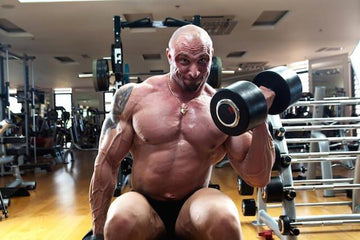

Losing Bodyfat Ups Your T Levels
Table of Contents
Losing Bodyfat Associated with Increased Testosterone
by Robbie Durand
Most bodybuilders know that certain vitamins such as Vitamin D and magnesium are essential for testosterone production, but if you are looking to increase your testosterone than it may make sense to go on a diet as well. It appears that increases in resting testosterone levels occur during high-volume and high-intensity training periods. You may think that eating more calories is more conducive to increasing testosterone, but new research suggests that being overweight can lower a man’s testosterone. A previous study found that testosterone levels are inversely correlated with greater body fat and insulin resistance. The more body fat one has, the more insulin resistant a person is. It is believed that the inverse relationship between testosterone and insulin resistance is mediated by body fat.
Epidemiological studies support a negative correlation between serum testosterone and obesity. It has been reported that obesity suppresses SHBG (i.e. testosterone carrier protein) and, as a result, total testosterone concentrations decrease. Researchers just reported in the Asian Journal of Sports Medicine that a resistance exercise program increased testosterone levels and boosted the insulin sensitivity hormone adiponectin in conjunction with a loss of body fat.
 In a semi-experimental study, twenty-one obese young men were randomly placed in two groups: resistance training and control. Resistance training protocol consisted of twelve weeks’ weight training (3 sessions per week, 10 exercises, 3 sets of 8 – 12 repetitions in each exercise, intensity 60% – 80% of one repetition maximum, rest between sets 1 minute and between exercises 2 minutes, duration of main training 20 – 40 minutes per each session). The researchers examined testosterone and adiponectin levels pre and post study.
In a semi-experimental study, twenty-one obese young men were randomly placed in two groups: resistance training and control. Resistance training protocol consisted of twelve weeks’ weight training (3 sessions per week, 10 exercises, 3 sets of 8 – 12 repetitions in each exercise, intensity 60% – 80% of one repetition maximum, rest between sets 1 minute and between exercises 2 minutes, duration of main training 20 – 40 minutes per each session). The researchers examined testosterone and adiponectin levels pre and post study.
At the end of the study, resistance training had no significant effect on body weight and body mass index, whereas it decreased body fat percent. The decrease in body fat was also associated with an increase in serum adiponectin (i..e increased insulin sensitivity), and testosterone concentrations were increased after resistance training while there were no significant changes in serum levels of these hormones in the control group. According to the findings of the present study, increased levels of adiponectin and testosterone after resistance training in obese young men, is associated with lower body fat and fasting insulin.
The takeaway findings of the study is that if you are looking to get maximal increases in testosterone from resistance exercise, it good to lose excess bodyfat. Even though the subject’s weight did not change in the twelve-week study, they lost bodyfat which was associated with an increase in testosterone and insulin sensitivity.
Moradi F. Changes of Serum Adiponectin and Testosterone Concentrations Following Twelve Weeks Resistance Training in Obese Young Men. Asian Journal of Sports Medicine. 2015;6(4):e23808.
Hiruntrakul A, Nanagara R, Emasithi A, Borer KT. Effect of endurance exercise on resting testosterone levels in sedentary subjects. Cent Eur J Public Health. 2010;18(3):169–72.
Tsai EC, Matsumoto AM, Fujimoto WY, Boyko EJ. Association of bioavailable, free, and total testosterone with insulin resistance: influence of sex hormone-binding globulin and body fat. Diabetes Care. 2004;27(4):861–8.
The premier source of training, nutrition, supplements, fat loss and health for men.

















